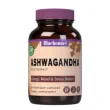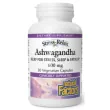Unlocking Ashwagandha: The Powerhouse Adaptogen

Key Takeaways
Ashwagandha's benefits include:- Stress Reduction: Significantly lowers cortisol levels, mitigating stress.
- Enhanced Performance: Improves physical performance and muscle strength.
- Mental Health Support: Offers potential benefits for depression and anxiety treatment.
- Cognitive Function: Supports brain health and memory enhancement.
Article by Arnie Gitomer Feb 25, 2024
Have you ever felt overwhelmed by stress and desperately needed a natural, effective remedy? Enter ashwagandha, an extraordinary adaptogenic herb. With roots firmly planted in ancient Ayurvedic medicine, ashwagandha is a frontline contender in natural stress relief, offering abundant benefits and properties.Ashwagandha, botanically meaning "strength of the stallion," is a fitting moniker for a plant with such resilience that has earned its nickname for its robust fortitude and adaptability. It's not just its potential to support a healthy immune system, enhance stamina, or act as a natural stress reliever that has garnered attention. It's the idea that ashwagandha, this potent adaptogen, can empower your body to better resist stress-induced physiological damage.
But what is an adaptogen, and why is ashwagandha so exceptional? As a well-respected figure in natural remedies, naturopath Edward Wallace puts it succinctly: adaptogens balance, restore, and protect the body. They help you respond effectively to stressors, bringing your body back to its ideal state of homeostasis.
At a glance: Ashwagandha as an Adaptogen
- Grown in Africa, India, and the Middle East. Known also as Indian ginseng, winter cherry, and somnifera root.
- Used extensively in Ayurvedic medicine for over 2,500 years.
- ‡ Develops the strength and vitality likened to that of a horse.
- Aids in stress responses, supports overall health, and improves the body's resilience.
With ashwagandha's remarkable adaptogenic attributes, we at Willner Chemists are excited to delve deeper into exploring this extraordinary herb and help you unlock its full potential for your health needs.
Understanding Ashwagandha: Its Origin and Use in Ayurveda
As we continue our exploration of ashwagandha, it's essential to understand its origins and how it's been used throughout history. Withania somnifera, or ashwagandha, is an ancient herb that has been an integral part of Ayurvedic medicine for over 2,500 years.
Originating in regions of the Middle East, India, and parts of Africa, this herb has earned various names, including Indian ginseng, winter cherry, and somnifera root. However, the name ashwagandha, translating to "smell of horse," aptly describes the aroma of its fresh roots, reminiscent of a horse. There's a long-held belief in traditional medicine that consuming this root may help you develop the strength and vitality of a horse, hence its nickname, the "strength of the stallion."
Ashwagandha has been utilized extensively in Ayurvedic practices due to its adaptogenic properties. As an adaptogen, ashwagandha aids the body in maintaining homeostasis, especially during times of physical or emotional stress. As naturopath Edward Wallace puts it, adaptogens like ashwagandha help balance, restore, and protect the body, allowing it to respond to any influence or stressor and normalize physiological functions.
At Willner Chemists, we offer a range of high-quality ashwagandha products that can help you experience the benefits of this adaptogenic herb. From Ashwagandha Root 1:1.5 to Ashwagandha Ext 300 mg, our selection is designed to cater to your unique health needs.
By understanding ashwagandha's rich history and use in Ayurveda, we can better appreciate its potential to improve our overall health and well-being. Stay tuned as we delve deeper into the specifics of the potential benefits of this powerhouse adaptogen in our upcoming sections.
Ashwagandha as an Adaptogen: Enhancing Body's Resilience to Stress
As used in traditional Ayurvedic medicine, one of the key roles of ashwagandha is its function as an adaptogen. But what does that mean?
Adaptogens: Nature's Stress Busters
Adaptogens are herbs that improve the body's ability to handle stress. They help the body adapt by normalizing physiological processes during periods of increased stress. Ideally, an adaptogen should reduce stress-induced damage, be safe, have stimulating effects, and not disturb bodily functions. Furthermore, they should be devoid of negative effects, such as withdrawal symptoms.
Ashwagandha: The Adaptogenic Powerhouse
Ashwagandha, a renowned adaptogen, ticks all these boxes. It exerts a stress-protective effect by regulating homeostasis via several mechanisms of action associated with the hypothalamic pituitary adrenal (HPA) axis. It also controls key mediators of the stress response, such as heat shock proteins (Hsp70), stress-activated c-Jun N-terminal protein kinase (JNK-1), cortisol, and nitric oxide (NO).
This adaptogenic action is why ashwagandha is often used to combat fatigue and stress-induced sleep disturbances. In fact, studies have shown that ashwagandha's use can significantly reduce stress and anxiety levels.
Ashwagandha at Willner Chemists
At Willner Chemists, we offer a variety of ashwagandha supplements. Our experts recommend our Ashwagandha 1000 mg for those looking to incorporate this adaptogen into their daily routine.
Ashwagandha is generally considered safe to take daily in the short term (two to three months). If you're considering taking ashwagandha for a longer period, we recommend speaking with your doctor before starting and while continuing any new supplement routine.
Armed with this information, you can now appreciate the adaptogenic power of ashwagandha. It's not just an herb; it's a resilience-enhancing, stress-busting powerhouse. In the next section, we'll explore more potential benefits of ashwagandha, from stress reduction to improved athletic performance.
Potential Benefits of Ashwagandha: From Stress Reduction to Improved Athletic Performance
If you're on a quest for natural remedies to counter stress, boost athletic performance, or improve sleep quality, ashwagandha may be your answer. This remarkable adaptogen has a plethora of benefits backed by scientific research. Let's dive into some of these benefits.
Stress and Anxiety Reduction
As we've mentioned earlier, ashwagandha is famed for its stress-busting properties. It's an adaptogen, a class of substances that help the body cope with stress. Researchers have found that ashwagandha can reduce the activity of the hypothalamic-pituitary-adrenal (HPA) axis, which is the central stress response system.
One study found that individuals who took ashwagandha supplements had significantly lower levels of the stress hormone cortisol compared to those who took a placebo. These studies are early, and more research is needed to form a consensus on appropriate forms and dosing.
Enhanced Athletic Performance
Ashwagandha isn't just for stress relief; it can also boost your athletic performance. Research has shown that it can benefit VO2 max, a measure of heart and lung fitness. VO2 max is the maximum amount of oxygen a person can use during intense exercise. It's important for everyone, not just athletes, as low VO2 max is associated with increased mortality risk.
In one study, athletes who took ashwagandha significantly increased muscle strength compared to those who did not. So, whether you're an athlete or a fitness enthusiast, ashwagandha might be a worthy addition to your supplement routine.
Improved Sleep Quality
Finally, ashwagandha might be your ticket to a good night's sleep. In one study, individuals who took ashwagandha supplements saw improvements in sleep quality compared to those who took a placebo.
Although these benefits are promising, they shouldn't replace professional medical advice. Always consult with a healthcare provider before starting any new supplement regimen.
We offer a range of Ashwagandha products at Willner Chemists, carefully selected for their quality and potency. Explore our selection today and unleash the potential of ashwagandha, the powerhouse adaptogen!
Ashwagandha and Mental Health: Its Role in Alleviating Symptoms of Depression and Cognitive Impairment
As an adaptogen, ashwagandha has incredible potential to support mental health. Let's explore its potential benefits in this area.
Easing Depression and Anxiety
Depression and anxiety can be debilitating. Thankfully, ashwagandha might offer some relief. A study involving individuals with schizophrenia found that those who took 1,000 mg of ashwagandha extract daily for 12 weeks showed significantly reduced symptoms of depression and anxiety compared to those who took a placebo.
However, it's essential to note that more research is needed to fully understand Ashwagandha's impact on mental health. As always, we recommend consulting with a healthcare provider before starting any new supplement regimen, especially if you're dealing with mental health conditions.
Improving Cognitive Impairment
Cognitive impairment can have a significant impact on quality of life, especially for individuals with conditions like bipolar disorder. Some research suggests that ashwagandha may help improve cognitive impairment in these individuals.
Incorporating ashwagandha into your routine might offer some cognitive benefits, but more research is needed to fully understand these effects.
Supporting Sleep and Other Mental Health-Related Issues
Sleep is crucial for overall health, and especially mental health. A 2021 review suggested that ashwagandha could help with insomnia and other mental health-related issues.
At Willner Chemists, we understand the importance of mental health. That's why we offer a range of high-quality ashwagandha products to support your well-being. As with any supplement, it's essential to consult with a healthcare provider before starting an ashwagandha regimen, especially if you're dealing with mental health conditions.
In summary, ashwagandha may have some potential benefits for mental health, including reducing symptoms of depression and anxiety, improving cognitive impairment, and supporting better sleep. We look forward to more research to help us understand the full extent of this adaptogen's potential to support mental health.
Ashwagandha and Male Fertility: How It Can Boost Testosterone Levels
Talking about mental health, we now move into a slightly different territory. Our discussion brings us to an interesting aspect of ashwagandha's potential benefits - its role in boosting testosterone levels and enhancing male fertility.
Ashwagandha: A Natural Boost for Testosterone
Ashwagandha adaptogen is not just about managing stress or improving mental health. This powerful herb has potential benefits for men's health, too. According to research, ashwagandha may help boost testosterone levels and increase fertility in men. This offers a natural, herbal way to support healthy reproductive functioning.
Ashwagandha: A Solution to Male Infertility?
Ashwagandha's potential role in enhancing male fertility is a topic of ongoing research. Its ability to improve hormone levels and boost sperm production hints at this possibility. This may be especially beneficial for individuals struggling with fertility issues.
Ashwagandha: Reducing Stress, Enhancing Fertility
Stress is a major factor that can affect fertility. High levels of stress can lead to hormonal imbalances, which in turn can impact fertility. The adaptogenic properties of ashwagandha can help manage stress levels. By bringing cortisol, our primary stress hormone, back into a normal range, ashwagandha could play a crucial role in promoting male fertility.
As with any supplement, talking to a healthcare provider before starting a regimen is important. The duration and dosage of ashwagandha intake should also be monitored carefully. We at Willner Chemists offer a range of ashwagandha supplements, and our team of experts is always ready to assist you in choosing the right product for your needs.
In the next section, we will discuss how this versatile adaptogen may also play a role in managing blood sugar levels. Stay tuned to learn more about the diverse benefits of ashwagandha.
Ashwagandha and Blood Sugar Levels: Its Potential Role in Managing Diabetes
As we continue to unravel the benefits of this dynamic herb, let's turn our attention to something that affects millions of people worldwide—blood sugar levels. Studies suggest that ashwagandha, the potent adaptogen, may significantly impact managing diabetes and high blood sugar levels.
Ashwagandha: A Natural Ally for Blood Sugar Regulation
Ashwagandha is not just about combating stress or boosting stamina. It also shows promise in the area of blood sugar regulation. A comprehensive review of 24 studies that included individuals with diabetes found that treatment with ashwagandha led to significant reductions in blood sugar levels, HbA1c (a long-term measure of blood sugar control), insulin, blood lipids, and oxidative stress markers.
This potent herb's potential effect on blood sugar levels could be attributed to its influence on insulin secretion and the ability of cells to absorb glucose from the bloodstream. While the research is still in its early stages, the evidence so far is promising.
A Note of Caution
While ashwagandha shows potential benefits in managing blood sugar levels, it's important to note that more well-designed studies are necessary to fully understand its effects. So, if you're considering ashwagandha as part of your diabetes management plan, we strongly recommend discussing it with your healthcare provider first.
Ashwagandha and Inflammation: How It Can Help Reduce Inflammation in the Body
Inflammation is the body's natural response to defend against harm, but when it persists, it can lead to chronic health conditions. Enter ashwagandha, an adaptogen that might have anti-inflammatory properties.
Ashwagandha's Potential Anti-Inflammatory Effects
In a 2021 study, participants took a formulation that included 2 grams of ashwagandha twice daily for 7 days. Compared with a placebo, the results showed a significant reduction in inflammatory markers such as CRP, IL-6, and TNF-α.
This formulation also contained other herbs like giloy ghanvati or Tinospora cordifolia (1 gram), swasari ras (2 grams), and tulsi or Ocimum sanctum (0.5 grams). Despite these promising results, it's important to note that the research on ashwagandha's potential effects on inflammation remains limited.
Still, these findings suggest that ashwagandha might potentially help manage inflammation in the body. This could be a significant development considering the role of chronic inflammation in various health conditions.
Supplementing with Ashwagandha
Here at Willner Chemists, we understand the potential benefits of ashwagandha as an adaptogen and anti-inflammatory agent. However, it's crucial to remember that ashwagandha's effects may not be immediate. You may need to take it for several months before noticing its effects.
Always consult with a healthcare provider before starting any new supplement regimen, especially if you're pregnant, breastfeeding, or have certain health conditions. Some people have reported side effects like gastrointestinal discomfort, drowsiness, diarrhea, and vomiting.
Conclusion
As an ashwagandha adaptogen, this herb has shown potential in reducing inflammation markers. While more research is needed, it's an exciting area of study that could potentially benefit many people dealing with chronic inflammation. It's essential to consult with a healthcare provider before starting any new supplement, including ashwagandha.
Safety and Dosage of Ashwagandha: What You Need to Know Before Starting a Regimen
Just like with any supplement, knowing how to use ashwagandha safely is crucial. As a trusted provider of high-quality nutritional supplements and herbal remedies, we at Willner Chemists always prioritize your safety. Here's what you need to know about the safety and dosage of ashwagandha.
Safety First
While ashwagandha is generally safe for most people, it's not for everyone. It may be best to avoid this supplement in certain conditions and circumstances. These include pregnancy, breastfeeding, and if you have specific health issues like prostate cancer, thyroid problems, or an autoimmune condition. It's also best to avoid ashwagandha if you're about to have surgery or if you have liver problems. Always consult with a healthcare professional before starting an ashwagandha regimen, especially if you are taking benzodiazepines or other medications.
Dosage Guidelines
When it comes to dosage, it's not one-size-fits-all. The right dose of ashwagandha can vary depending on several factors, including your health condition and individual tolerance. Research has shown that dosages ranging from 250–1,250 mg daily can be effective. You can take ashwagandha in many forms, either in a single dose or multiple doses throughout the day, with meals, or on an empty stomach.
However, it's essential to remember that the effects of ashwagandha take time to appear and that its long-term effects remain unknown. Most experts recommend using it for up to 3 months. As always, consult with a healthcare professional for personalized guidance.
Your Health, Our Priority
At Willner Chemists, we're dedicated to helping you navigate your health journey with confidence. Whether you're considering adding ashwagandha adaptogen to your routine or exploring other supplements, we're here to offer expert advice and guidance.
When it comes to your health, always put safety first. Always speak with a doctor to ensure ashwagandha or other supplements are safe for you to use.
Ultimately, it's all about finding the right balance and the best regimen for your needs. Together, we can unlock the power of ashwagandha and help you lead a healthier, more balanced life.
Conclusion: The Power and Potential of Ashwagandha as an Adaptogen
We've journeyed through the myriad benefits and potential applications of ashwagandha, a potent adaptogen used in Ayurvedic medicine, for over 2,500 years. From its roots in the Middle East and India to its widespread use in the modern world, it's clear that ashwagandha is significant in natural health and wellness.
Ashwagandha, known as the "strength of the stallion," lives up to its name by enhancing stamina and resilience. Its adaptogenic properties allow it to balance, restore, and protect the body, helping us respond effectively to stressors and maintain homeostasis. It's a versatile herb that supports mental health, aids blood sugar management, boosts male fertility, and even shows promise in managing neurodegenerative diseases and rheumatoid arthritis.
At Willner Chemists, we're dedicated to bringing you the highest quality natural health products, including a variety of ashwagandha supplements. Whether you prefer the convenience of Ashwagandha vCaps or the flexibility of Ashwagandha Root powder, our selection ensures you can incorporate this powerhouse adaptogen into your daily routine in a way that suits you best.
While ashwagandha is generally considered safe for short-term use, it's always prudent to consult your healthcare provider before starting any new supplement regimen, especially if you have a chronic condition.
In conclusion, the power and potential of ashwagandha as an adaptogen are undeniable. Its extensive benefits make it an invaluable addition to your wellness journey. Let's harness the strength of the stallion and stride forward to a healthier and more balanced life.
For further reading, check out our blog, where we delve deeper into natural health and wellness.
 |
Read more about Arnie Gitomer |
Product Search Results

|
Ashwaganda Root Ext 400 mg | Bluebonnet | $22.00 | 68850 |

|
Ashwagandha 600 mg Sensoril | Natural Factors | $15.16 | 52930 |

|
Ashwagandha Ext 300 mg | Jarrow Formulas | Login for Willner pricing. $26.99 | 50091 |

|
Ashwagandha Rt Ext Std 300 mg | Solgar | $14.54 | 33241 |

|
Ashwagandha vCap | Willner Phyto Tech | $15.40 | 67463 |
